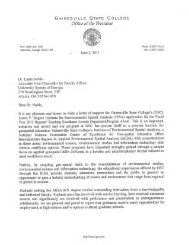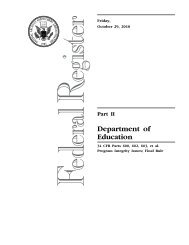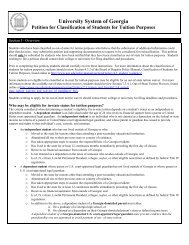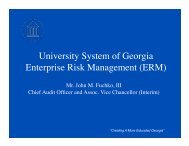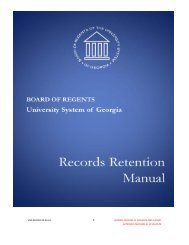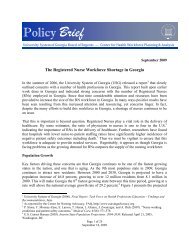75 years of transforming lives - University System of Georgia
75 years of transforming lives - University System of Georgia
75 years of transforming lives - University System of Georgia
You also want an ePaper? Increase the reach of your titles
YUMPU automatically turns print PDFs into web optimized ePapers that Google loves.
<strong>75</strong> YEARS OF TRANSFORMING LIVES<br />
2001 and beyond<br />
The New Millennium Brings Record Enrollments,<br />
National Attention for Academic Excellence<br />
and Continued Strategic Direction<br />
2001<br />
Academic Excellence is Recognized<br />
<strong>Georgia</strong> became one <strong>of</strong> a handful <strong>of</strong> states with<br />
more than one institution ranked among the top<br />
20 public national universities in the U.S. News<br />
& World Report’s annual college rankings. This<br />
national recognition underscored the fact that institutions<br />
in <strong>Georgia</strong> were academically competitive<br />
with schools throughout the nation.<br />
2003<br />
Targeting African-American Males<br />
The <strong>System</strong> launched an African-American Male<br />
Initiative to enhance access by black men to<br />
higher education and increase black male enrollment<br />
in the USG.<br />
Record Enrollments and Rising SAT<br />
Scores Signal a New Era<br />
The benefits <strong>of</strong> earlier <strong>System</strong> initiatives to<br />
strengthen admissions standards, improve accessibility,<br />
and enhance the quality <strong>of</strong> instruction<br />
at institutions statewide, plus the impact <strong>of</strong><br />
<strong>Georgia</strong>’s HOPE scholarship, resulted in record<br />
enrollments and significant increases in SAT<br />
scores <strong>of</strong> entering freshmen across the state.<br />
PRISM Working to Close the Gap in<br />
Student Achievement in Math and Science<br />
The Board <strong>of</strong> Regents received a $34.6 million,<br />
five-year grant from the National Science Foundation<br />
(NSF) to boost student achievement in<br />
science and mathematics. The grant enabled<br />
the <strong>University</strong> <strong>System</strong> to play a leading role<br />
in the Partnership for Reform in Science and<br />
Mathematics (PRISM), a collaborative statewide<br />
educational reform initiative. PRISM is helping<br />
to improve teaching and learning for more than<br />
170,000 students and more than 10,000 teachers<br />
in participating schools throughout <strong>Georgia</strong>.<br />
2003-2005<br />
The <strong>System</strong> Wields<br />
Formidable Economic Clout<br />
The economic impact <strong>of</strong> the <strong>System</strong> became evident<br />
in the middle <strong>years</strong> <strong>of</strong> the first decade <strong>of</strong> the<br />
21st century as the Board <strong>of</strong> Regents’ economic<br />
impact study determined that <strong>Georgia</strong>’s 34 public<br />
colleges and universities annually contribute<br />
$23.3 billion to the state’s economy.<br />
2004-2005<br />
<strong>System</strong> Revises Relationships with Cooperative<br />
Organizations<br />
Uncertainty regarding the exact relationship<br />
among the Board <strong>of</strong> Regents, the <strong>University</strong> <strong>of</strong><br />
<strong>Georgia</strong> and the <strong>University</strong> <strong>of</strong> <strong>Georgia</strong> Foundation<br />
caused the Board <strong>of</strong> Regents to re-evaluate and<br />
revise its own policies related to cooperative organizations.<br />
The new Board <strong>of</strong> Regents’ policy<br />
ensured that cooperative organizations such as<br />
foundations did not have authority over institutional<br />
presidents. Three outcomes <strong>of</strong> the new<br />
policy included the ending <strong>of</strong> the relationship between<br />
UGA and the UGA Foundation; a request<br />
that all <strong>System</strong>-related cooperative organizations<br />
sign new memorandums <strong>of</strong> understanding<br />
with the Board; and a change in presidential<br />
compensation so that all salaries and benefits<br />
would hereafter be paid from public funds. The<br />
policy change eliminated the practice <strong>of</strong> direct<br />
supplemental salary contributions from cooperative<br />
organizations and made the USG the first<br />
system in the nation to move presidential pay<br />
entirely to state funds.<br />
2005<br />
A New College is Born<br />
In 2005, the first new institution in the <strong>University</strong><br />
<strong>System</strong> <strong>of</strong> <strong>Georgia</strong> since 1970 was created in<br />
Gwinnett County. The Board <strong>of</strong> Regents transformed<br />
its Gwinnett <strong>University</strong> Center into <strong>Georgia</strong><br />
Gwinnett College, to serve the fastest growing<br />
region in the state.<br />
<strong>System</strong> Capital Expansion Priorities Total<br />
$3.4 billion<br />
Priorities for capital expansion totaled a record<br />
$3.4 billion in new campus facilities statewide as<br />
the <strong>System</strong> prepared to meet increasing enrollment<br />
growth and requirements for state <strong>of</strong> the<br />
art facilities. By then, the Major Capital Projects<br />
Priority List had become the primary strategic<br />
process for determining the most critical needs<br />
for facilities in the <strong>System</strong> and for securing state<br />
funding for these facilities.



